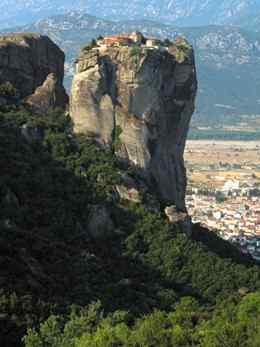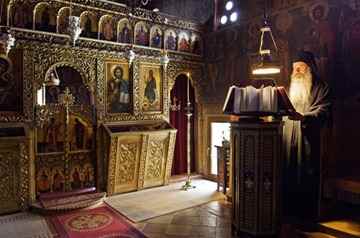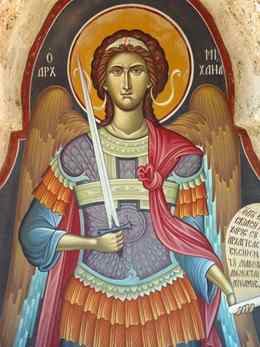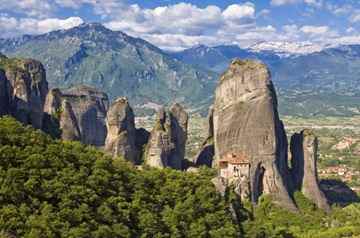Set high on the sandstone cliffs, the Greek Orthodox monasteries of Meteora have looked out over the valleys of Thessaly since the fourteenth century, but the religious history of the place is far older.
 There are place names that intrigue and invite us to discover more. Who can see the name Meteora without imagining a connection with the heavens? Indeed, the name of this historic site in the Greek province of Thessaly means “suspended in the air”, an apt description given the height of the giant rock needles crowned by the great treasure of the place, its ancient monasteries.
There are place names that intrigue and invite us to discover more. Who can see the name Meteora without imagining a connection with the heavens? Indeed, the name of this historic site in the Greek province of Thessaly means “suspended in the air”, an apt description given the height of the giant rock needles crowned by the great treasure of the place, its ancient monasteries.
 Since time immemorial, ascetics and hermits recognised these plains, with their whimsically shaped sandstone pinnacles carved by time and erosion, as a perfect place to engage in prayer and contemplation, but it was not until the twelfth century that the Orthodox Christians set up a monastic community here. This was the first rung on a ladder to the divine, built of bricks and faith over the years until the fourteenth century, the golden period of Meteora, when a total of 24 monasteries were in existence, of which only six remain today with just a handful of monks and nuns inhabiting their hallowed walls.
Since time immemorial, ascetics and hermits recognised these plains, with their whimsically shaped sandstone pinnacles carved by time and erosion, as a perfect place to engage in prayer and contemplation, but it was not until the twelfth century that the Orthodox Christians set up a monastic community here. This was the first rung on a ladder to the divine, built of bricks and faith over the years until the fourteenth century, the golden period of Meteora, when a total of 24 monasteries were in existence, of which only six remain today with just a handful of monks and nuns inhabiting their hallowed walls.
 The almost inaccessible sandstone columns of Meteora are now a UNESCO World Heritage Site and a popular tourist destination. The best place to start a visit to the monasteries is from Kalambaka or Kastraki, the main cities of Meteora, ascending to Rousanou, founded in the middle of the fifteenth century and dedicated to Saint Barbara and Saint Nicholas Anapafsa. Silhouetted against the grey of the rock, the Church of St Nicholas is one of the iconic images of Meteora and contains the famous frescoes by the Cretan artist Theophanis Strelitzas.
The almost inaccessible sandstone columns of Meteora are now a UNESCO World Heritage Site and a popular tourist destination. The best place to start a visit to the monasteries is from Kalambaka or Kastraki, the main cities of Meteora, ascending to Rousanou, founded in the middle of the fifteenth century and dedicated to Saint Barbara and Saint Nicholas Anapafsa. Silhouetted against the grey of the rock, the Church of St Nicholas is one of the iconic images of Meteora and contains the famous frescoes by the Cretan artist Theophanis Strelitzas.
 The secluded Monastery of Saint Stephen, one of the more accessible, also boasts bright frescoes, dating from the mid sixteenth century. Perhaps the most challenging access is offered by the Monastery of the Holy Trinity, but visitors who complete the ascent by steps carved into the rock are rewarded by a spectacular panoramic view. The largest monstery, and one of the most impressive, is Megalo Meteora, whose Church of the Transfiguration is one of the most beautiful in Greece. Its wonders include the apse frescoes of the Holy Communion and the image of Athanasios,the founding abbot who compiled the rules that still govern the monastic life of Meteora.
The secluded Monastery of Saint Stephen, one of the more accessible, also boasts bright frescoes, dating from the mid sixteenth century. Perhaps the most challenging access is offered by the Monastery of the Holy Trinity, but visitors who complete the ascent by steps carved into the rock are rewarded by a spectacular panoramic view. The largest monstery, and one of the most impressive, is Megalo Meteora, whose Church of the Transfiguration is one of the most beautiful in Greece. Its wonders include the apse frescoes of the Holy Communion and the image of Athanasios,the founding abbot who compiled the rules that still govern the monastic life of Meteora.
 Finally, not far off is the Varlaam Monastery. Build in 1541, it is a haven of silence where pilgrims bearing candles mix with beared and black-habited monks and tourists marvel at the wonderful seventeenth century Byzantine side chapel or parekklesion of the Three Bishops. The view from Varlamm is unforgettable: you look out from the balustrade onto a sea of mystical rock columns crowned by monasteries that seem to balance in the abyss of time, high above the valleys of Thessaly.
Finally, not far off is the Varlaam Monastery. Build in 1541, it is a haven of silence where pilgrims bearing candles mix with beared and black-habited monks and tourists marvel at the wonderful seventeenth century Byzantine side chapel or parekklesion of the Three Bishops. The view from Varlamm is unforgettable: you look out from the balustrade onto a sea of mystical rock columns crowned by monasteries that seem to balance in the abyss of time, high above the valleys of Thessaly.
Source: Hello Magazine [November 02, 2010]